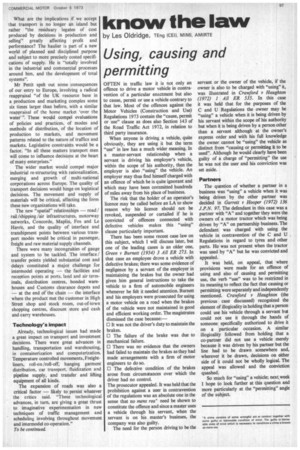know the law
Page 99

If you've noticed an error in this article please click here to report it so we can fix it.
by Les Oldridge, TEng (CEO, MIMI, ArVIIRTE
Using, causing and permitting
OFTEN in traffic law it is not only an offence to drive a motor vehicle in contravention of a particular enactment but also to cause, permit or use a vehicle contrary to that law. Most of the offences against the Motor Vehicles (Construction and Use) Regulations 1973 contain the "cause, permit or use" clause as does also Section 143 of the Road Traffic Act 1972, in relation to third party insurance.
When anyone is driving a vehicle, quite obviously, they are using it but the term "use" in law has a much wider meaning. In a master-servant relationship when a servant is driving his employer's vehicle, within the scope of his authority, then the employer is also ,"using" the vehicle. An employer may thus find himself charged with an offence of which he is quite ignorant and which may have been committed hundreds of miles away from his place of business.
The risk that the holder of an operator's licence may be called before an LA to show reason why his licence should not be revoked, suspended or curtailed if he is convicted of offences connected with defective vehicles makes this "using" clause particularly important.
There has been some recent case law on this subject, which I will discuss later, but one of the leading cases is an older one, Green v Burnett (1954) 3 All ER 2,3. In that case an employee drove a vehicle with defective brakes; there was some evidence of negligence by a servant of the employer in maintaining the brakes but the owner had given him general instructions to take the vehicle to a firm of automobile engineers whenever he felt it needed attention. Burnett and his employers were prosecuted for using a motor vehicle on a road when the brakes or the vehicle were not maintained in good and efficient working order. The magistrates dismissed the case because: 1 It was not the driver's duty to maintain the brakes.
0 The failure of the brake was due to mechanical failure.
0 There was no evidence that the owners had failed to maintain the brakes as they had made arrangements with a firm of motor engineers to do so.
CI The defective condition of the brakes arose from circumstances over which the driver had no control.
The prosecutor appealed. It was held that the prohibition against a user in contravention of the regulations was an absolute one in the sense that no mens rea• need be shown to constitute the offence and since a master uses a vehicle through his servant, when the servant is on his master's businses, the company was also guilty.
The need for the person driving to be the servant or the owner of the vehicle, if the owner is also to be charged with "using" it, was illustrated in Crawford v Haug/ton (1972) 1 All ER 535. In this case it was held that for the purposes of the C and U Regulations the owner may be "using" a vehicle when it is being driven by his servant within the scope of his authority but when it is being driven by a person other than a servant although at the owner's express order and with his full knowledge the owner cannot be "using" the vehicle as distinct from "causing or permitting it to be used". Although he would clearly have been guilty of a charge of "permitting" the use he was not the user and his conviction was set aside.
Partners
The question of whether a partner in a business was "using" a vehicle when it was being driven by the other partner was decided in Garrett v Hooper (1972) 136 J.P.N. 97. The defendant in this case was a partner with "A" and together they were the owners of a motor tractor which was being driven by "A" on partnership business. The defendant was charged with using the vehicle in contravention of the C and U Regulations in regard to tyres and other parts. He was not present when the tractor was used by "A" but he was convicted and appealed.
It was held, on appeal, that where provisions were made for an offence of using and also of causing and permitting use, the verb "use" was to be restricted in its meaning to reflect the fact that causing or permitting were separately and independently mentioned. Crawford v Houghton (the previous case discussed) recognized the element of illogicality in holding that a person could use his vehicle through a servant but could not use it through the hands of someone specifically authorized to drive it on a particular occasion. A similar illogicality followed from holding that a co-partner did not use a vehicle merely because it was driven by his partner but the line had to be drawn somewhere and, wherever it be drawn, decisions on either side of it could not be wholly logical. The appeal was allowed and the conviction quashed.
So much for "using" a vehicle; next,week I hope to look further at this question and more particularly at the "permitting" angle of the subject.
















































































































































